Many newer RVs require 50 amp service. Unfortunately, the number of RV parks or resorts that offer such service can be limited in certain locations.
Especially if you like to take your RV to explore more rural locations, it’s essential to have a generator onboard that can supply sufficient power to your 50 amp RV.
Deciding exactly how many watts your RV pulls at a given time can be a tricky proposition.
You’ll need to understand the electrical needs for your largest appliances as well as the wall outlets where you plug into smartphones and other devices.
So, what size generator for 50 Amp RV? The bare minimum size generator I would recommend you selecting a 4,000 watt generator for a 50 amp RV. Although your exact power needs will on the ratings of your specific appliances, as well as how many appliances you typically run at once will determine how big a generator you need. When running multiple appliances simultaneously, however, your power needs might exceed that number.
In the remainder of this article, I’ll explain how to determine your RV’s electrical needs so that you can select the right generator for 50 amp RV use.
I’ll also review four excellent portable generators rated for 50 amp use and provide answers to some of the most frequently asked questions about 50 amp electrical service.
How To Choose The Right Size generator for 50 amp RV
While 4,000 watts is a great minimum rating to start from, there are many other factors to consider before you settle on the right generator for your power needs.
The first step in choosing the right size generator for your 50 amp RV is to pick the power-outage scenario from the three below.
Let’s start by looking at how you can go about adding up your RV’s electrical needs and then explore several other factors that will weigh into your final purchase decision.
1: Determining How Many Watts Does A 50 Amp RV Use
To understand your electrical needs, we need to start by understanding the maximum wattage supplied by a 50 amp service.
A 50 amp service supplies a total of 12,000 watts because a 50 amp plug actually has two 120-volt hot wires. Some refer to this as a 120/240 split service.
The formula for determining wattage requires in a 50 amp service RV multiplying amps by volts. If we multiply 50 amps by 120 volts, we get a rating of 6,000 watts. But because a 50 amp connection has two hot wires, we can then double that wattage to achieve a maximum rating of 12,00 watts.
But we have to be careful here because it can be easy to jump to the conclusion that the generator you choose should be able to supply 12,000 watts.
However, this is not necessarily int the case. A generator that powerful can be very expensive and actually provide much more power than you’ll really use.
2: Determining Your Electrical Needs
Determining your RV’s electrical needs requires careful consideration of the startup and running wattages for your various appliances.
Startup wattage refers to the amount of power an appliance needs to get started. Running wattage is the amount of power needed for that appliance to keep running.
As you’ll see in the table from Honda below, startup wattage is generally higher than running wattage.
Appliance | Starting wattage | Running wattage |
Microwave oven | 1,000/1,300/1,500 | 1,000/1,300/1,500 |
RV refrigerator | 600 | 180 |
Electric grill | 1,650 | 1,600 |
Coffee maker | 800 | 800 |
Blender | 850 | 400 |
Satellite receiver | 250 | 240 |
Radio | 50-200 | 50-200 |
Laptop | 200-250 | 200-250 |
Toaster | 1,150 | 1,150 |
TV | 200 to 600 | 200 to 600 |
It’s important to note here, however, that the specific electrical ratings of the appliances may differ from the numbers in this chart.
These are general numbers to give you an idea of which appliances in your 50 amp RV might require the most power.
3: Choosing Enough Wattage For Your 50 amp RV
So now let’s look at how to choose enough wattage for your 50 amp RV’s specific needs.
And let’s start with clarifying startup wattage versus running wattage. Your RV’s appliances are going to consume more power when starting up than they will once they’re already running.
This means that you should place more weight on finding a generator that supplies enough startup wattage for your appliances, rather than focusing on running wattage.
The major factor that will determine the needs of a 50 amp RV is whether you have one or two air conditioning units on your rig. A 50 amp RV with a single air conditioning unit will most likely be fine with a 4,000-watt generator. But the addition of a second 15,000 BTU A/C will cause your startup can cause your startup wattage requirements to jump substantially.
Calculating the startup wattage for your RV’s largest appliances is the place to start when determining how much wattage you’ll need in a generator.
RV Air Conditioner Size | Starting wattage | Running wattage |
7000 BTU | 1700 Watts | 600 Watts |
10,000 BTU | 2000 Watts | 700 Watts |
13,500 BTU | 2700 Watts | 1250 Watts |
15,000 BTU | 3500 Watts | 1500 Watts |
The air-conditioning unit (or units), refrigerator, and microwave are three examples of appliances with the largest electrical draws in a typical RV.
While it can be tempting to simply add up the startup wattages for all of your appliances and then buy a generator that meets that rating, that’s often a means for overspending on a large generator that you might not really need.
For starters, you most likely aren’t (and shouldn’t be) running all of your appliances at the same time.
Being mindful of running only certain appliances simultaneously is a great way to reduce your overall power needs and also increase the overall engine life of the generator that you do select.
It should also be noted that buying a generator that supplies more wattage than you actually a need is essentially a waste.
There’s no sense in buying a 12,000-watt generator if you’re only consistently running appliances with a maximum need closer to 6,000 watts.
You’ll essentially have 6,000 watts of wasted energy at that point and your operation will be very inefficient overall.
Things To Consider When Buying A 50 amp RV generator
1: Generator Weight
Because 50 amp RV generators tend to house larger engines, they also weigh more than smaller models.
By nature, this makes them less portable. Although some models come with wheels that help you roll them from place-to-place, there will inevitably be instances where you’ll need to lift one of these generators.
So make sure you’re comfortable with the weight of the generator you’re interested in before finalizing your decision.
2: Parallel Connection?
Certain generators are designed to connect to another similar model to provide additional power for your RV.
While most 30 amp RVs might not require this additional wattage, this is a more important consideration for those seeking a 50 amp service.
Although these generators are rated to produce enough startup wattage for the typical RV air conditioning unit, running your A/C, refrigerator, microwave, and fans while having multiple devices plugged into wall outlets may overload cause your generator to fall a bit short of your power needs.
While we highlighted some of the reasons why you shouldn’t run all of your appliances simultaneously above, buying a generator with parallel capability will allow you to increase the amount of power supplied to your RV at a later time, should the need arise.
3: Fuel Type
Most generators run on either gas, propane, or diesel fuel. Some are called ‘dual fuel’ generators and those are capable of running on some combination of those fuel types.
Gasoline and propane are the most common combinations used by dual fuel generators because they tend to be a bit more readily available than diesel fuel.
It makes sense to choose a generator that runs on the same fuel type as your RV.
Diesel RVers can easily stock up on that fuel type for their generator every time they make a fuel stop, and the same can be said for RVers with gas-powered rigs.
The main advantage of a propane generator is the extended shelf life of the fuel (when compared to gas and diesel fuel).
However, access to a reliable propane refill station will dictate whether or not a propane generator makes sense for you.
4: Noise Output
A lot of these 50 amp RV generators claim to use something called ‘Quiet Technology’ and, while it’s true that these generators make less noise than some of their predecessors, they aren’t going to be completely silent.
They’ll produce somewhere between 55 and 70 decibels when running, and some only achieve their quietest noise output when operating in Eco-Mode, which is usually at 25 or 50 percent load.
So don’t be surprised if the generator you purchase makes more noise than advertised when operating at 100 percent of its capacity.
Noise output is an important consideration, however, because you’ll want something that doesn’t keep you up at night or upset your neighbors at the next RV park you pull into.
That being said, I wouldn’t weight this factor above the others that I’ve detailed above.
Top 4 Best Generator For 50 Amp RV In 2023
Which Generator With 50 Amp RV Plug Is The Best Choice?
Now you know that the answer to this question depends on a number of decisions that are going to be unique to your RV lifestyle.
That being said, I’m going to use this section to detail four of the best portable generators with 50 amp RV plug. So here are the 4 of the best Generators For 50 Amp RV
1: Best Overall: Westinghouse IPro4200 Inverter Generator For RV
If you’re looking for a portable generator that’s trusted on construction sites, the Westinghouse iPro4200 is rated for industrial-grade use.
That’s why many professional contractors bring these generators onto job sites to run their wide selection of power tools.
With a 2.6-gallon fuel tank, you’ll be able to run this generator for up to 18 hours at 25 percent of its total load capacity.
Because it’s rated for 4,200 peak watts, this generator provides enough power to start up and consistently run even the largest RV air conditioning units.
Things We Like
Things We Don’t Like
2: Best For Cold Climates: Champion 3800-Watt Dual Fuel RV Ready Portable Generator
Although many folks buy RVs specifically so that they can change locations when the weather gets cold, the Champion 3800-watt Dual Fuel generator with Cold Start Technology is the perfect choice for those of us to decide to overwinter in our rigs.
In the event of a fuel shortage of one kind or another, you’ll be glad that this generator can run on either propane or gas.
Run times vary depending on which fuel type you’re using. It also features a built-in surge protector that protects your RV’s appliances from overloads and unpredictable power surges.
Things We Like
Things We Don’t Like
3: Best Budget: DuroStar DS4000s 4000 Watt 50 Amp RV Generator
Some of these 50 amp RV generators can get a little pricey, but the DuroStar DS4000s is a budget-friendly option that will still deliver enough power to start up a large 15,000 BTU air conditioning unit.
It’s made to withstand the rigors of construction sites, so it’s also a great generator for those that live in locations that frequently experience inclement weather.
The low-oil shutoff feature on this generator helps to protect the engine from running dry and, in doing so, extends the overall life of the engine.
It also reminds you that it has been a bit too long since you’ve topped off the oil.
This generator has a 120-volt 30 amp plug and two 120-volt 20 amp outlets, so the only caveat is that you’ll need a dogbone adapter to plug in your 50 amp RV.
Things We Like
Things We Don’t Like
4: Best for Quiet Operation: Champion 4000-Watt RV Ready DH Series Quiet RV Generator
With a noise output of just 64 decibels when running at 25 percent load, the Champion 4000-watt DH Series generator is an excellent choice for those that don’t want to upset their RV park neighbors with an excessively loud generator.
It has a 2.9-gallon gas tank that gives it the longest run time of any Champion generator; up to 17 hours at a 25 percent load.
While this generator produces 4,000 peak watts and 3,500 running watts, it can also be connected to two 2800-watt inverter or digital hybrid generators to provide additional power for your 50 amp RV.
You’ll need to purchase an optional parallel connector kit to make this happen, but it’s a great option for RVers that need power to two large air conditioning units in hot climates.
Things We Like
Things We Don’t Like
Frequently Asked Questions
The power needs of an RV are dependent on the design of its specific electrical system. In this section, I’ll provide a few helpful answers to questions about 50 amp service and how it differs from 30 amp service.
What Is A 50 Amp Service?
The formula for calculating the wattage of an electrical connection requires multiplying amperage by voltage (amps x volts = watts).
So, if you multiple 50 amps by 120 volts (the rating for the hot wire on this type of service), you get 6,000 watts.
However, 50 amp plugs actually have two 120-volt hot wires. This means that you essentially get double power or 12,000 watts of electrical capacity.
In technical terms, this is called a 120/240 split service. A 50 amp service comes with two 120-volt hot wires, a neutral, and a ground.
This means that the equation for total wattage looks more like this:
50 amps x (120 volts x 2) = 50 amps x 240 volts = 12,000 watts
How Do 50 Amp And 30 Amp Service Differ?
One major difference between 50 amp and 30 amp service is the number of hot wires in the connection. While a 50 amp service has two 120-volt hot wires, a 30 amp service only has a single hot wire.
So, when you do the math on total wattage for a 30 amp service, you’ll see that it supplies a total of 3,600 watts (30 amps x 120 volts).
This is typically sufficient to supply power to an air conditioning unit, microwave, refrigerator, television, and several wall outlets, but a 50 amp service is considerably more powerful.
This is one reason why many RVs that feature two air conditioning units require 50 amp service.
Can I Plug A 50 Amp RV Into 30 Amp Service?
Yes you can Plug A 50 Amp RV Into 30 Amp Service, but it is not recommended. In theory, this is possible with the help of a dogbone electrical adapter, but plugging a 50 amp RV into a 30 amp service means you’ll be limited to 30 amp capacity and it can result in a lack of usability for certain 50 amp RV appliances.
Conclusion
I’ve personally dealt with a lack of reliable service from my RV park’s electrical supply and I can tell you that it’s not pleasant, especially when you’re paying for electricity that you should be able to rely on.
Having a generator is essential for a 50 amp RV, even if you simply use it as a backup power source.
There have been several occasions in my lifetime where we’ve had to use our RV generator to provide backup power for our entire home.
During an extended power outage in your neighborhood, you’ll be glad you purchased that larger portable generator to keep the lights on and the heater running!

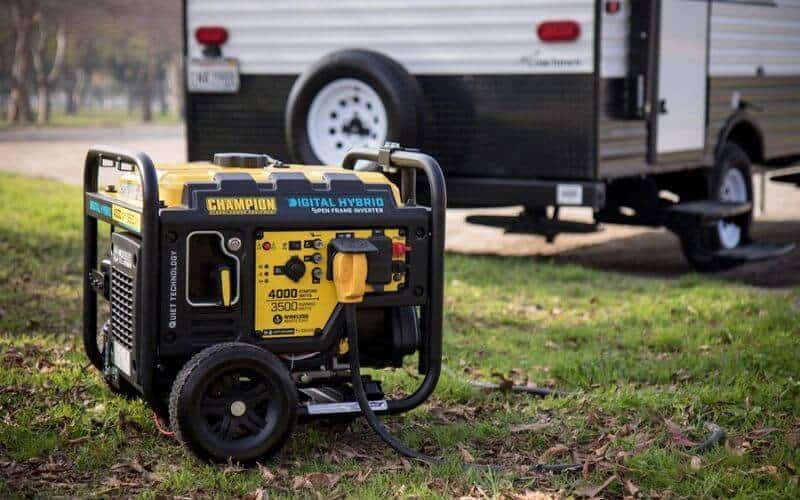



![10 Best RV Surge Protectors & Electrical Management Systems for [currentyear] (30 & 50 Amp) 8 RV Surge Protectors_ Why Do You Need One, & Which Is The Best](https://www.rvingknowhow.com/wp-content/uploads/2020/04/RV-Surge-Protectors_-Why-Do-You-Need-One-Which-Is-The-Best-150x150.jpg)
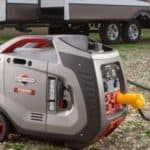
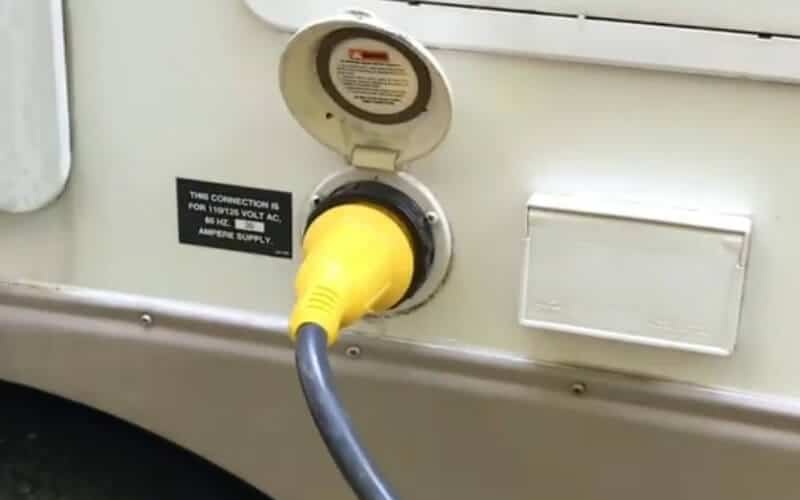
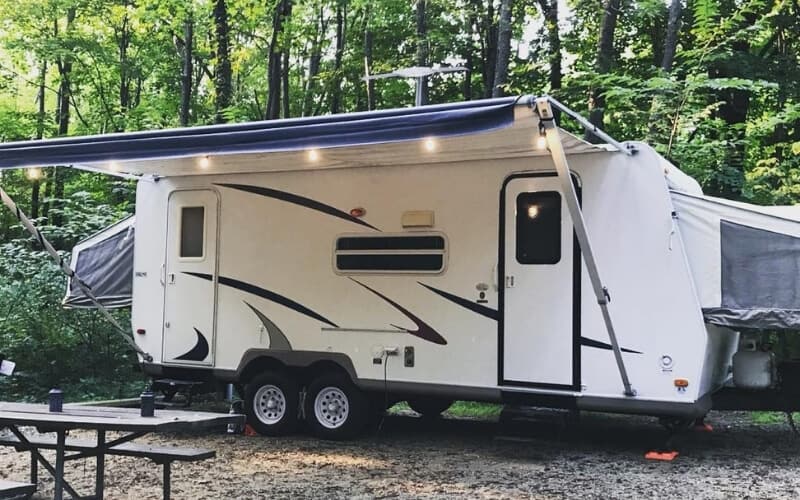
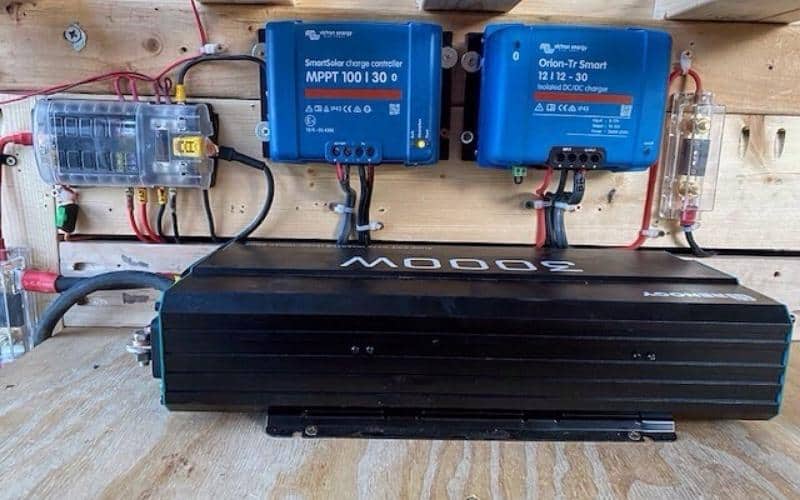
5 Comments
Eric
4 years agoFantastic article with loads of information. I had a question, if I am renting a travel trailer requiring 50amps because of 2 ac units but do not expect to be running them both at the same time, would you conclude that a 30amp service (such as my father in laws 3000w generator) would be sufficient? We are primitive camping with a toddler that will only need 1 AC for a couple hour nap in middle of the day.
Aaron Richardson
4 years agoSize matters when it comes to power, but you do not want something too bulky. The size of your air conditioner will determine how big a generator you need. It consumes the most wattage. For example, if your air conditioner requires 2800 – 3000 starting watts, and 1500 – 2000 running watts, a 3,000 watt RV generator will be sufficient for working your air conditioner.
South Plains Hunter
3 years agoI am seven months late to reply, but limit other electric items. Definitely don’t use microwave and ac at same time. Turn off frig maybe wanted. Just keep it closed. Most situations, tripping breakers are worst result. No permanent damage.
Dion Roundtree
4 years agoSuch a great article, but I keep saying “what if”. I have a Troybilt 6250/8500 generator.
My 5th wheel is 50 amp. All we want to do is run 1 AC 15000W, and few lights. this generator only has a 30amp plug. By using the dogbone plug you mentioned, will it damage my converter? The fridge is on it’s last leg, so don’t need to run it right now.
Aaron Richardson
4 years agoSorry I think you’ve a 15,000 BTU Window Air Conditioner not 15000W.